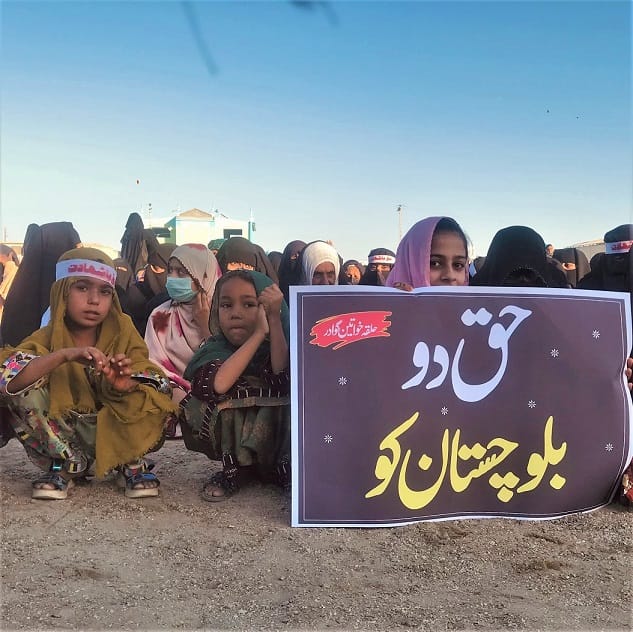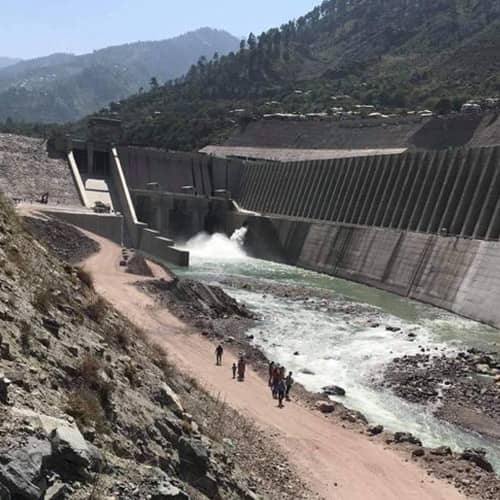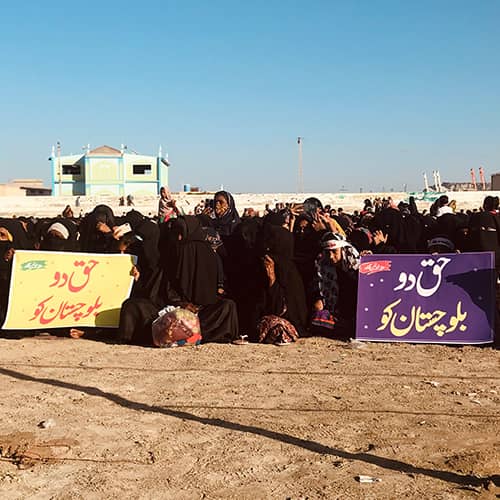On December 13, 2021, more than 2000 women gathered at this dusty, barren playground along the Gwadar Port in Southern Balochistan. Usually off-limits to them, these women wearing black shawls and white ribbons tied around their heads inscribed with slogans "Rights or Martyrdom", had gathered at the playground to demand "good schools with good teachers."
Some of the teenage girls standing on one side of the crowd were being interviewed by media personnel. They carefully looked at the reporter IDs on the neck straps before deciding whether to speak in Urdu or Balochi.
Hani Baloch, 15, is among these girls and she speaks with all the passion of youth of her age. “Instead of building more check-posts, the government should set up good schools for us and staff them with good teachers,” Hani says as she explains why a large number of women had gathered in the playground.
A friend of Hani’s, also standing among the girls, starts reciting a poem she knows by heart. Facing the cameras, she starts after drawing a long breath.
“This land is ours since the beginning of time;
how can you say it is yours;
Balochistan is ours;
Balochistan is ours.”
Among the protesters was another teenage girl who said she was taking part in the demonstration to resist the state’s coercion.
“Why are you breaking the constitution? Why are you abducting our youths despite having courts and why dump their decomposed bodies when you should be following due process of law,” she spoke to the cameras.
An elderly woman present in the ground chimed in, saying, “Why our youths are not presented before courts if they have done something wrong?”
Another woman also demanded an end to the enforced disappearances. “Some of us have been waiting for our missing husbands, brothers and sons for the past many years.”
Demands of Gwadar women
In September 2021, the Maritime Security Agency (MSA), which is responsible for Pakistan’s naval borders, dug up a trench on the eastern beach of the city, not only barring the local fishermen's access to the sea but also the return of those already out at sea.
The local fishermen of Mohallah Mullaband in the southern portion of Gwadar were the worst hit due to this move. Earlier, Zainab, a woman from the area, staged a sit-in outside the port’s main gate along with other women of the community. The women made a short video of their protest and shared it with a local leader, Maulana Hidayat-ur-Rehman, who had led several protests in parts of Gwadar before. Rehman was on his way to Quetta when he received the video. He deferred his travel plans to return to Gwadar and join the women’s protest.
His participation fuelled the intensity of the protest, forcing the MSA to open the way for the fishermen. This success also proved to be the starting point of the movement 'Gwadar ko haq do' - Give Gwadar its Rights.
The women's protest was part of the same movement. It started on November 16, 2021, and concluded a month later on December 16. The protesters were demanding uninterrupted supply of electricity, gas and water, ban on commercial fishing trawlers in the sea and removing restrictions on local movement due to security check-posts.
The biggest of this demonstration was on December 10 in which thousands of women participated. None of these women had ever taken part in any protest before. They claimed to know little about politics but they said that they had no other option but to take to the streets for their survival.
The protesting women said that the commercial fishing trawlers had not left any fish in the sea for the local fishermen. “Our men spend the entire day in the sea but return empty handed,” they said, adding that it left them with nothing to earn a livelihood.
One of their major demands was checking the contraband dealers and closing the liquor shops in the city. “We do not have an ordinary painkiller in our households but sheesha and crystal-meth are openly available in the city," said a woman while putting forth her demands. "We do not have a drop of water to drink but liquor is available in the city round the clock.”
Women participation in politics
Among the founders of the "Gwadar ko haq do" movement is Hidayat-ur-Rehman, who is also the general secretary of the Jamaat Islami (JI) Balochistan chapter.
On December 6, JI’s Ameer Sirajul Haq came to Gwadar to express solidarity with the protesters. When he was coming down the stage after addressing the gathering, the protesters asked him how he could express solidarity with Baloch people when members of his party’s student wing Islami Jamiat Talaba (IJT) were attacking Baloch students in Punjab and demanding that these students return to their hometowns in Balochistan.
 Many teenage girls took part in the demonstration to resist the state’s coercion
Many teenage girls took part in the demonstration to resist the state’s coercionJI’s chief refused to answer the question, terming it a propaganda of Baloch nationalists. No one asked the same question of Hidayat-ur-Rehman despite the fact that he had been trained at the IJT platform.
The locals explained that Rehman never made "Gwadar ko haq do" movement subservient to the JI’s objectives and aspirations.
“My association with JI is a personal issue while this movement belongs to every Baloch,” Rehman said.
He said he had vowed not to tie up the movement to any party agenda from the very beginning. "It is meant to be a movement of the Baloch people," he said. "For the same reason, I have directed the JI’s local workers to keep their party flags away from the movement's gathering."
Political observers question how Rehman managed to mobilize a large number of women despite his affiliation with a conservative religious party when progressive and liberal Baloch parties have failed to do so despite having a deep influence in Gwadar.
Saadia Baloch, a Quetta based social activist, explains that one reason for Rehman’s success in mobilizing the women was he did not discriminate against women, giving their demands the same weightage as men's.
"He vociferously took up the issue of banning liquor in Gwadar like all other demands, " said Baloch. "On the other hand, there is a strong possibility of many local men not backing this demand put forward by women."
Also Read

Public interest versus national interest: Government violates its own rules for building Kohala hydro power project
She said that Baloch male nationalist leaders had never taken the women seriously. “Even when they do so, they just keep it symbolic. Perhaps this is the reason why they fail to gain public trust and lose their political relevance.”.
However, she added, that Baloch women taking part in politics was nothing new. She said that to press the missing persons issue, many women had staged protest camps at the Quetta Press Club for several months while others took part in the long march from Quetta to Islamabad, walking on foot over a long distance to highlight the issue in 2013.
“In other words, Baloch women have been quite vocal about the issues affecting them,” she added.
Published on 6 Apr 2022



















